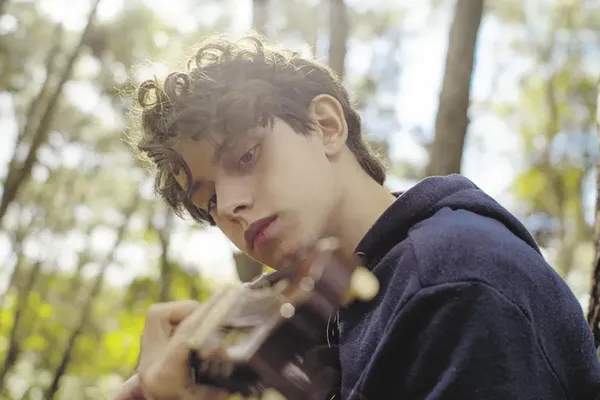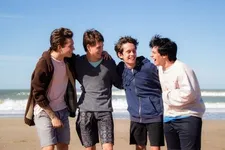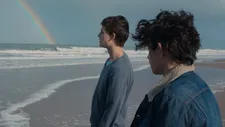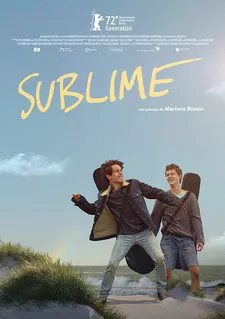 |
| Martín Miller in Sublime |
In spring 2022, independent Argentinian film Sublime hit the festival circuit and began a journey which saw it charm audiences all around the world. Following the lives and loves of a group of teenagers who play together in a band, it looks at what happens when friendship turns into something more and a seemingly unbreakable bond between two boys is put to the test. When it screened at BFI Flare, I took the opportunity to talk to director Mariano Biasin and ask him how he found a young cast with such amazing chemistry.
“It was a big casting,” he says. “We started making the casting before the pandemic, I had a group that I had already chosen, but in the middle of nowhere, we had to stop for the pandemic. And then one year after, we had to recast, and that's where Martín Miller, the main actor, appeared. We had worked together before, but at the point when we started making the casting, he was too young. The pandemic was good news for him, because when we decided to go shoot the film, he was the perfect age.
 |
| The boys in the band |
“I wanted this friendship to look as fresh and as real as possible, and they didn't know each other, so we had a lot of rehearsals. We didn't rehearse the scenes but we rehearsed the relationships.”
This involved improvising similar scenes, he explains, and exploring situations like the ones the teenagers encounter in the story.
We discuss how that story developed.
“I had done a short film, seven years ago now. It was a coming of age story and it went very well with the festivals. I was very happy with the result so I wanted to make something similar, but more complex, for my first feature film.
“I have a lot of input in the story from my life. These characters are very different, one from each other, but I wanted to create this feeling of anything can happen and they are going to be friends forever. Something like that. That's also the meaning for the beginning of the film: when they were kids, they had this strong friendship already. Now it’s going to have a challenge during the film, because of the new things that are happening to them, but I love the strong friendships, I have strong friendships myself. I won't spoil anything but surely I believe friendship always finds a way.”
It’s an interesting way to explore those developing feelings because there's almost no homophobia in the film, except perhaps for internalised feelings. I ask if he wanted to explore what life could be like for young people without that.
“Exactly,” he says. “That's why the film is not like the picture of the reality in Argentina, because I believe we are not very close to that yet, but I believe a lot of kids are talking more freely about that. I wanted to make this film to celebrate that because when I decided to add this LGBT thing in the story, I had the feeling that in most of the stories of this kind, the conflict is in the LGBT matter, and in my story, I wanted to have that as a flavour but not as a conflict. The problem here is not that he likes a boy, the problem is that he likes his friend, and that can put his friendship in danger.”
It's also obviously putting pressure on the band, I note, and tell him that I like the way that Manuel’s father talks to him at one point about whether or not you can play without bass guitar. It made me think of the idea of loving somebody like salt, something that you don't notice until it's gone.
 |
| On the beach |
“Thank you,” he says. “For me, the music part is a lot to do with myself, because it can speak for those who don't dare to choose to express their feelings, in a simple way. Music helped me always a lot, at least to be able to let it go, to find a way to move feelings, to release them. For me it's funny and there’s something nice about feeling that Felipe's all the opposite, because he's fire, he's making decisions and solving the problems in one second, and Manuel maybe takes a lot of time. The whole movie, he has somethiing breaking his back until he finds a way to to keep going.”
So how did the musical side of the film come together?
“The music composer, Emilio Cervini, is a very close friend of mine. We have played together in rock bands. And he's also my brother in law because he's dating my sister. So we are family, and we work a lot with the music. He created some demos for each part before of the film, for each part of the story. We started to try with the kids how they sound and how they go with the songs and the style. And I had some input in the lyrics because I wanted the songs to be not too obvious, but at the same time to make use of this connection between what the actor is feeling and what's happening in that moment in the story scope.
“It was a really nice process to make these songs, and we are now planning to release the album because the songs are very good when you hear them with a good mix, because the feeling is like they are playing live. When we started to listen how they could sound with a good sound, and we mixed the songs professionally, the songs are very good and they sound very good, so we're going to release them as an album.
“I think the family and the school are ingredients that had to be in the story because it's part of Manuel’s life. I didn’t want to go too much deeper with that part because when I started to think how I was going to shoot the story, to see how the camera was going to work with the character, I had the feeling that the power of the story is that this is a character's story and we are always in his head. He doesn't care a lot about school, he doesn't care about his family, so those parts appear but they have not much interest in the story because he doesn't care about them that much.”
We discuss the camera work, which is really close up a lot of the time, making the action feel more immediate and impulsive.
 |
| Sublime poster |
“We wanted to use one lens for almost the whole movie,” he explains "I needed to change the lens at some points but I would say that 90% of the movie is one 27mm lens, working really close with the main character, surrounding him from behind, in his face, in his eyes, when he was playing. That was the idea – we found that this kind of lens gave that feeling of being really close and telling the story in first person. Because if I was going to be far away from him, I had a feeling that we were going to start noticing the camera, and I wanted it to be like part of the movement and his reality.
“We shot for 24 days. Most of them were in interiors. We were shooting in the pandemic and there were no vaccines so it was a very stressful time, because I was praying every night that the cell phone doesn't ring in the night saying that anyone had symptoms because in in this kind of production, we cannot afford to stop and to continue shooting another day. And we had no scenes to shoot without Manuel and Felipe. So it was very hard, but we were lucky, and we worked hard to do with the protocols for the reason not to have any problem. But we were safe all the time, from the beginning to the end. And we had for two weeks interiors like the school rehearsal room, the houses, and then we went to the beach to shoot one week for all the exterior shots.”
The film first made a splash in Berlin.
“It was very special for me,” he says, “because I was there before with my first short film, and it was the best place in the world to let the film be born. It was very, very nice. We had a great reaction from the people and had a lot of talking with people in the theatre after the screenings.”
He’s working on a very different project now, but he made sure to take some time out to enjoy that special feeling which stems from having an unexpected hit. Sublime will finally be available on Video on Demand in the UK on 6 February, so you can see what all the fuss is about.





















